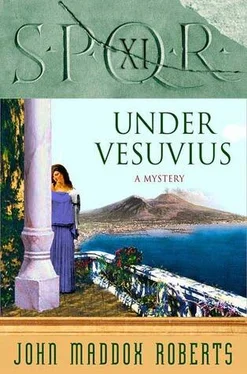John Roberts - Under Vesuvius
Здесь есть возможность читать онлайн «John Roberts - Under Vesuvius» весь текст электронной книги совершенно бесплатно (целиком полную версию без сокращений). В некоторых случаях можно слушать аудио, скачать через торрент в формате fb2 и присутствует краткое содержание. Жанр: Исторический детектив, на английском языке. Описание произведения, (предисловие) а так же отзывы посетителей доступны на портале библиотеки ЛибКат.
- Название:Under Vesuvius
- Автор:
- Жанр:
- Год:неизвестен
- ISBN:нет данных
- Рейтинг книги:3 / 5. Голосов: 1
-
Избранное:Добавить в избранное
- Отзывы:
-
Ваша оценка:
- 60
- 1
- 2
- 3
- 4
- 5
Under Vesuvius: краткое содержание, описание и аннотация
Предлагаем к чтению аннотацию, описание, краткое содержание или предисловие (зависит от того, что написал сам автор книги «Under Vesuvius»). Если вы не нашли необходимую информацию о книге — напишите в комментариях, мы постараемся отыскать её.
Under Vesuvius — читать онлайн бесплатно полную книгу (весь текст) целиком
Ниже представлен текст книги, разбитый по страницам. Система сохранения места последней прочитанной страницы, позволяет с удобством читать онлайн бесплатно книгу «Under Vesuvius», без необходимости каждый раз заново искать на чём Вы остановились. Поставьте закладку, и сможете в любой момент перейти на страницу, на которой закончили чтение.
Интервал:
Закладка:
I accepted the gift. "You are a generous man and a good loser, Diogenes."
He smiled again. "I am a Greek. We are good at losing."
He took his leave, and when he was gone Hermes said, "He arrived with his losses already counted out and bagged. Decius Caecilius, I believe you've just been bribed."
"No, I've just won five thousand sesterces. That Greek may think he's bribed me, but he's wrong."
"Bribed to do what?" Hermes wondered.
"Doubtless we'll know soon enough," I assured him.
That evening, Julia and the other women had a sniffing party. They made admiring sounds over the fine cedar box and the beautiful glass vials, and then they unstoppered them and began to dab scent on themselves, on each other, and on their slave girls. Each new perfume brought a babble of excitement. When all had been tried, the women gazed at the vials in wonder.
"Decius," Julia said, "these are some of the costliest scents in the world. This collection is worth far more than you won with your foolish bet."
"No bet is foolish if it wins," I told her. "Maybe it was you the Greek wanted to bribe."
"The vials are Babylonian glass, the very finest," Antonia reported. "Any time that Greek wants to bribe me, I'll be glad to accept."
"I'm not certain it's the Greek doing the bribing," I said.
"Manius Silva?" Julia said.
"He and Diogenes are partners," I said. "It would make sense if Silva wanted to bribe me, to send his foreign lackey and keep his own hands clean."
"I notice," Circe said, "that no one thinks the Greek is just a foolish gambler who is princely about gift giving."
When the laughter died down, Hermes enlightened her. "I've been asking around. He's not just Greek, he's from Crete. Everyone knows that the Cretans are born liars and connivers. They couldn't be truthful under torture."
"I've never liked them," Antonia said. She had good reason. Her father was known as Antonius Creticus. But the Creticus was not an honorific voted by the Senate. It was bestowed in derision by the populace when he was defeated by the Cretans. In my opinion, any Roman who could get himself whipped by Cretans deserved worse than a funny name.
"What else did you learn?" Julia asked Hermes.
"Just that he's recently back from a purchasing expedition. It seems each year he makes a circuit of the big markets: Alexandria, Antioch, Cyprus, Berytus, and so forth. He spends about half the year at this, then he returns and spends the balance of the year here in Baiae."
"And what did you learn about Silva?" I asked him. "Presumably you didn't just snoop around about the Greek." Hermes was my freedman and client. He also considered himself my protector. Like my family, he thought I was incompetent to protect myself, so he compulsively investigated anything he thought might be a threat to me, such as this Greek with his enigmatic bribe.
"Manius Silva is the son of a freedman. His wife comes from a highly placed local family, although rumor has it she became a prostitute after her father was ruined during Sulla's proscriptions."
"I knew that belly button was too big for a respectable woman," Circe said.
"What else?" I asked Hermes.
"Silva owns a big perfumery down by the shore on the edge of town. Besides the perfumes he buys, Diogenes also brings back a lot of ingredients and materials from his trips. The perfumery does a lot of mixing, blending, refining, and so forth."
"That must be the building we passed after we visited Neptune's temple two days ago," Julia said. "Remember the smell?"
Circe sighed. "Like all the flowers in the world, and musk and ambergris-"
"Musk and what?" I asked her.
"Ambergris," Julia told me. "It's a mysterious, waxy substance found floating in the sea. A naturalist at the museum in Alexandria told me that it is thought to be secreted in the stomachs of whales and vomited up when they are sick."
I was not sure I had heard her correctly. "You are telling me that perfumes are made with whale puke?"
"You'd be surprised at what goes into perfume," Antonia said. "The placentas of some animals, the anal glands of certain-"
"Tell me no more," I pleaded, shutting my eyes. "There are some things we men should never know!"
The evening came for our dinner with Norbanus and his gilded wife. Their home was not a town house in Baiae but rather a villa just off the road connecting Cumae and Baiae, and only about five miles from where we were staying. The connecting road was made brilliant with torches and lanterns and melodious with singers and musicians. Lest anyone get bored along the quarter mile to the house, men dressed as satyrs chased women dressed (or, rather, undressed) as nymphs through the copses by the road.
"Oh!" Antonia said, pointing to one especially impressive satyr, "I hope he catches a nymph! I'd like to see that in action."
Julia squinted toward the hairy, horned Dionysian. "Surely it's not real."
We had no chance to find out, as we arrived at the villa a few minutes later, the satyr having had no success in his pursuit of the fleet-footed nymphs.
Norbanus and Rutilia greeted us, the lady dressed this time in another Coan-cloth gown, this one not merely transparent but practically invisible. Their welcomes were effusive and rich with false humility. Slaves brought us garlands and the huge flower wreaths that were the custom of the district. Perfumed water was sprinkled on our hands and hair, and we were given large bowls of watered wine. To my astonishment, there were lumps of ice floating in the wine.
"Where do you get ice at this time of year?" I asked.
"It's brought down in winter from the mountains," Norbanus explained. "There are lakes up there that freeze, and the ice is sawn into blocks. These are packed in straw and carried down in wagons. We store the blocks in caves dug into the hillsides, packed with more straw. Stored this way, it melts very slowly and will last until the end of summer. Most of the larger villas here have ice caves."
"There is always some new decadence to be found in Campania," I said. "I may never recover from this stay."
Rutilia smiled. "Let us hope not. Rome could stand a little sophistication. Especially when this year is over." She meant that this was a censorship year, the one year in five when a pair of beady-eyed old senators whipped the public morals into shape. This year, one of them, Appius Claudius, made it his special mission to purge the Senate of unworthy members, taking special aim at men who had squandered their patrimonies and gone deeply into debt. He considered the chronic indebtedness of the governing class to be the greatest evil of the age. He cracked down on violators of the sumptuary laws; those who wore silk in public or more rings per finger than the law allowed, or who spent too much on weddings or funerals, and other threats to the Republic.
There has always been a faction among us who attribute the virtue and success of our ancestors to the great simplicity in which they lived. They think that we've been corrupted by things like soft beds and hot baths and Greek plays and decent food. If we'd just go back to living in huts, they say, sleeping on the ground, eating coarse barley and hard cheese, we could regain our ancestral virtue. These men are deeply insane. Our ancestors lived simply because they were poor. I, personally, do not want to be poor.
"Come meet our other guests," Rutilia said. "I believe you already know some of them."
And indeed we did. There were Publilius the jewel merchant and Mopsus the silk importer and a dyestuff tycoon and several others we'd met, plus an Alexandrian banker and a Greek shipbuilder who were new to us. Then I spotted Gaeto across the triclinium, conversing with Manius Silva. Rutilia followed my gaze.
"My apologies for having him here. He has-business dealings with a number of the more important people here. It doesn't do to snub him, much as one might wish to. I hope you don't mind."
Читать дальшеИнтервал:
Закладка:
Похожие книги на «Under Vesuvius»
Представляем Вашему вниманию похожие книги на «Under Vesuvius» списком для выбора. Мы отобрали схожую по названию и смыслу литературу в надежде предоставить читателям больше вариантов отыскать новые, интересные, ещё непрочитанные произведения.
Обсуждение, отзывы о книге «Under Vesuvius» и просто собственные мнения читателей. Оставьте ваши комментарии, напишите, что Вы думаете о произведении, его смысле или главных героях. Укажите что конкретно понравилось, а что нет, и почему Вы так считаете.









